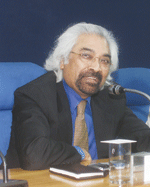 Recognising knowledge as key capital in the 21st century, prime minister Dr. Manmohan Singh constituted the National Knowledge Commission (NKC) in 2005, with the brief to suggest ways and means to transform India into a knowledge powerhouse.
Recognising knowledge as key capital in the 21st century, prime minister Dr. Manmohan Singh constituted the National Knowledge Commission (NKC) in 2005, with the brief to suggest ways and means to transform India into a knowledge powerhouse.
To successfully address the challenges posed by India’s massive human capital or demographic dividend (550 million Indians are below 24 years of age), we evolved a strategy to improve access to knowledge; reinvigorate institutions where knowledge concepts are imparted; develop world class academic environments for creation of knowledge; promote applications of knowledge for sustained and inclusive growth; and encourage knowledge applications in efficient delivery of public services. The commission felt that adoption and implementation of this human capital development strategy will place India firmly on the path to sustainable development.
Since 1991, while the Indian economy has recorded high rates of annual growth, the education sector has been afflicted by inertia. It has not been able to keep pace with the aspirations of the 550 million youth in the country and provide them with the appropriate skill sets and learning opportunities. Consequently, we have not been able to harness our greatest asset — human capital. This challenge was the starting point of the work of NKC. To create a knowledge-driven gener-ation for the future which will sustain the growth momentum of the economy, NKC has been attempting to bring education to the forefront of policy deliberations and public debates across the country.
To this end, the commission has consulted numerous experts and stakeholders within the government and outside it, to formulate over 200 recommendations on 26 diverse facets of the emerging knowledge economy. Throughout our deliberations, we have consciously focused on addressing the problems of the entire knowledge spectrum, instead of taking a narrow view of education. From our perspective, wide-ranging reforms in the wider knowledge society, and dynamic re-shaping of knowledge systems in the country are critical to create impact and generate change.
At the bottom of the knowledge pyramid, to enhance access to quality elementary education, we have proposed recommendations on enacting the Right to Education Bill and generational changes in the school system with emphasis on greater management decentralisation, flexibility in disbursal of funds and community participation in decision making, among other things.
At the other end of the spectrum, in higher education we have stressed the need for expansion of the system to facilitate greater access, improvement of the quality of education and advocated inclusion in the interests of equity. Moreover, the objective of our proposal to establish an Independent Regulatory Authority of Higher Education is to reform regulatory structures in tertiary education, and to create a new paradigm of governance which will encourage openness, transparency and remove cumbersome barriers blocking the entry of new institutions of higher education.
During the three years past since the NKC was established, we have also suggested reforms to improve the quality of research in universities and beyond, which is crucial if India is to be at the forefront of cutting edge innovations in industry and agriculture. Currently, we have very few institutions capable of conducting quality research, resulting in a flight of academic talent from the country. We have also stressed the need for collaboration in research through greater use of new technologies. The creation of a National Knowledge Network (NKN) linking all research and education institutes in the country through a high-width broadband network, will allow live data and resource sharing as well as unprecedented collaboration.
For the successful implementation of our recommendations, we have reached out to the Central and state governments and have received encouraging response. The Central government’s acceptance of our vision is evident in the proposed outlay of Rs.270,000 crore for education in the Eleventh Plan, a five-fold increase over the allocation in the Tenth Plan.
However even as we are actively working with governments in New Delhi and the states, we are acutely aware that the reforms process is slow. Education is a sensitive subject, and policies are largely formulated at the state level and tend to generate vibrant debate. Given this milieu, sometimes our recommendations have not been translated into policy. Nevertheless we believe that in the three years past, we have succeeded in creating a groundswell of favourable opinion within the citizenry and stakeholders of the education system, in favour of systemic reform.
Looking back, I believe the establishment of the NKC has been a unique endeavour which has proved successful in bringing education to the centre stage of the national development debate. From here on, it’s only a matter of time before the process of reform of Indian education across the spectrum begins in right earnest.
(Sam Pitroda is chairman of the National Knowledge Commission)